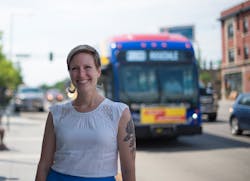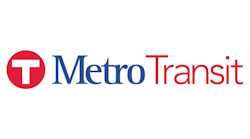- One word to describe yourself: Focus
- Alma Mater: Indiana University; Master of Urban and Regional Planning (MURP) – University of Minnesota
- Favorite book: “Station Eleven" by Emily St. John Mandel and any other superb post-apocolyptic tale
- Favorite TV show: “The Americans”
- Favorite hobby(ies): Gardening, biking, hiking and cooking
- Fun fact about yourself: She baked bagels to pay the bills while working in her first unpaid internship at Metro Transit.
- What is your favorite transit system (outside of the one you work for or have worked for!) and why?: Freiburg (Germany) VAG! This is the system she used as a student, when she learned how easy car-free and transit-rich life could be.
Katie Roth grew up in a suburban community with limited exposure to transit. But as an undergraduate studying sustainability at Indiana University. She spent a semester abroad in Freiburg, Germany, quickly learning to appreciate how mobility and transit-supportive development can make a city more sustainable, vibrant and accessible. The experience led her to pursue a master’s degree in urban and regional planning at the University of Minnesota and to a career in transit. As a Project Manager in Metro Transit’s Bus Rapid Transit/Small Starts Project Office, Roth is now leading efforts to better serve existing customers and attract new riders by bringing faster, more frequent bus service to a dozen of the Twin Cities’ busiest transit corridors. Under Roth’s leadership, the region’s first rapid bus line opened in 2016, leading to an immediate increase in bus ridership in the corridor.
Roth’s career began in 2006 as in intern in Metro Transit’s Service Development department, where she studied the effects of the state’s first light-rail line. The internship confirmed her desire to work in transportation and to a role as a Senior Transit Planner at SRF Consulting Group, Inc. (SRF). At SRF, Roth helped lead a year-long study of service and facility improvements in corridors with the highest bus ridership in the Twin Cities. She was the key author of the resulting Arterial Transitway Corridors Study, published in 2012. The study provided a clear, cohesive strategy for a network of twelve rapid bus lines that would cover 100 miles, include 400 enhanced stations and see an estimated 160,000 average weekday boardings.
Travel times in these corridors will be improved by up to 25 percent through a combination of transit signal priority, wider stop spacing, enhanced buses with front and rear entries and off-board fare payment and ticket vending machines. Her work on this study brought Roth back to Metro Transit, where she led the planning, engineering and implementation of the region’s first rapid bus line, the A Line. As a project lead, Roth brought multiple departments together to develop policies for training, scheduling and operations prior to the A Line’s June 2016 opening. She was also deeply involved in community outreach efforts, working closely with partners at the city, county and state levels to ensure the $27 million project had community support and was built with a minimal amount of disruption.
There has also been considerable economic development along the corridor. Minnesota’s first professional soccer team is building a new stadium along the A Line, expecting many of its fans to travel to and from the urban location on transit. In 2017, the A Line was recognized by WTS Minnesota with an Innovation Transportation Solutions Award. The award not only recognized the A Line’s success but leadership roles played by nearly three dozen women at Metro Transit and its consultant Kimley-Horn. As a leader in Metro Transit’s Bus Rapid Transit/Small Starts Project Office, Roth is now managing a team of planners, engineers, consultants and outreach staff working to bring rapid bus service to other corridors identified as top candidates for rapid bus service. Engineering for the region’s second rapid bus line, connecting downtown Minneapolis and some of the region’s most transit-dependent communities, is underway. Construction is slated to begin in 2018. Planning is also ongoing for a rapid bus line that will extend more than 18 miles, serving downtown Minneapolis and the state’s busiest transit center at the Mall of America. Each of these projects will also intersect with planned light rail extensions, requiring careful planning for both construction and operations.
She currently serves as an advisory board member. Roth is also an active community member, having served as a board member on her neighborhood community council and as a board member for Seward Redesign, Inc., a non-profit real estate developer committed to supporting the local economy by creating affordable housing and living-wage jobs. A Minneapolis resident, Roth is a daily transit rider whose customer experience has a large influence on her work.
"I enjoy knowing that the impact of the work that we do here at Metro Transit really has the potential to influence and positively impact so many people. When I think about how far reaching that impact can be — in terms of where people choose to live, how they get to work, how they move their families around and how they interact with their neighbors and communities — it's really cool to think of how transit can be at the heart of that."
"I was really lucky during college to get an unpaid internship at Metro Transit counting riders as part of the before and after study for our first light rail line. That unpaid internship experience led to a a formal internship experience the following summer, which led me into transit as a career. It ultimately made it clear to me that this was where I wanted to build a professional home."
"I think the most challenging part of my job is a fun challenge, to make the case to people who maybe don't ride transit every day or don't understand the impact. To make the case to why investing in bus service really matters and in a time of constrained resources and everybody fighting for the same public dollars, trying to make it clear what the investment in transit is a big challenge, but one that is an increasingly fun thing to do."




